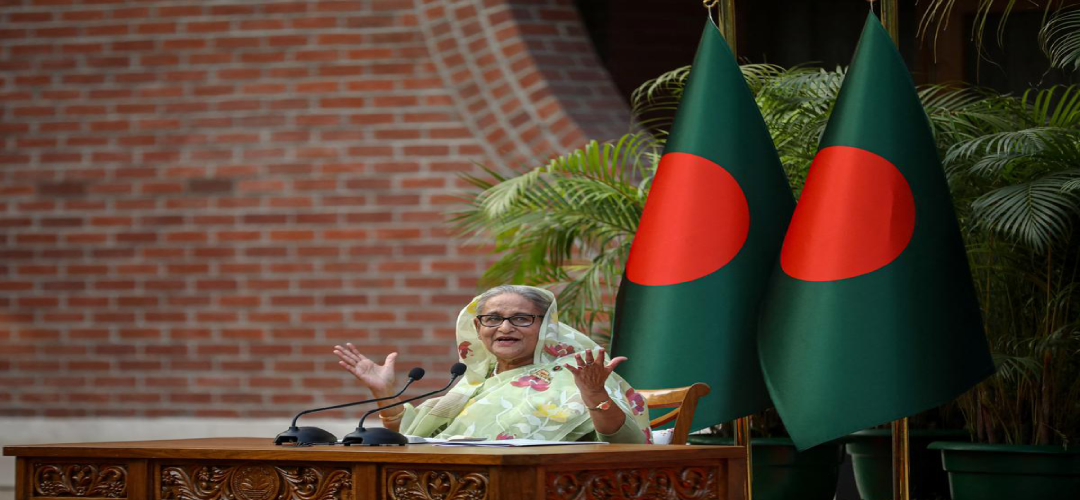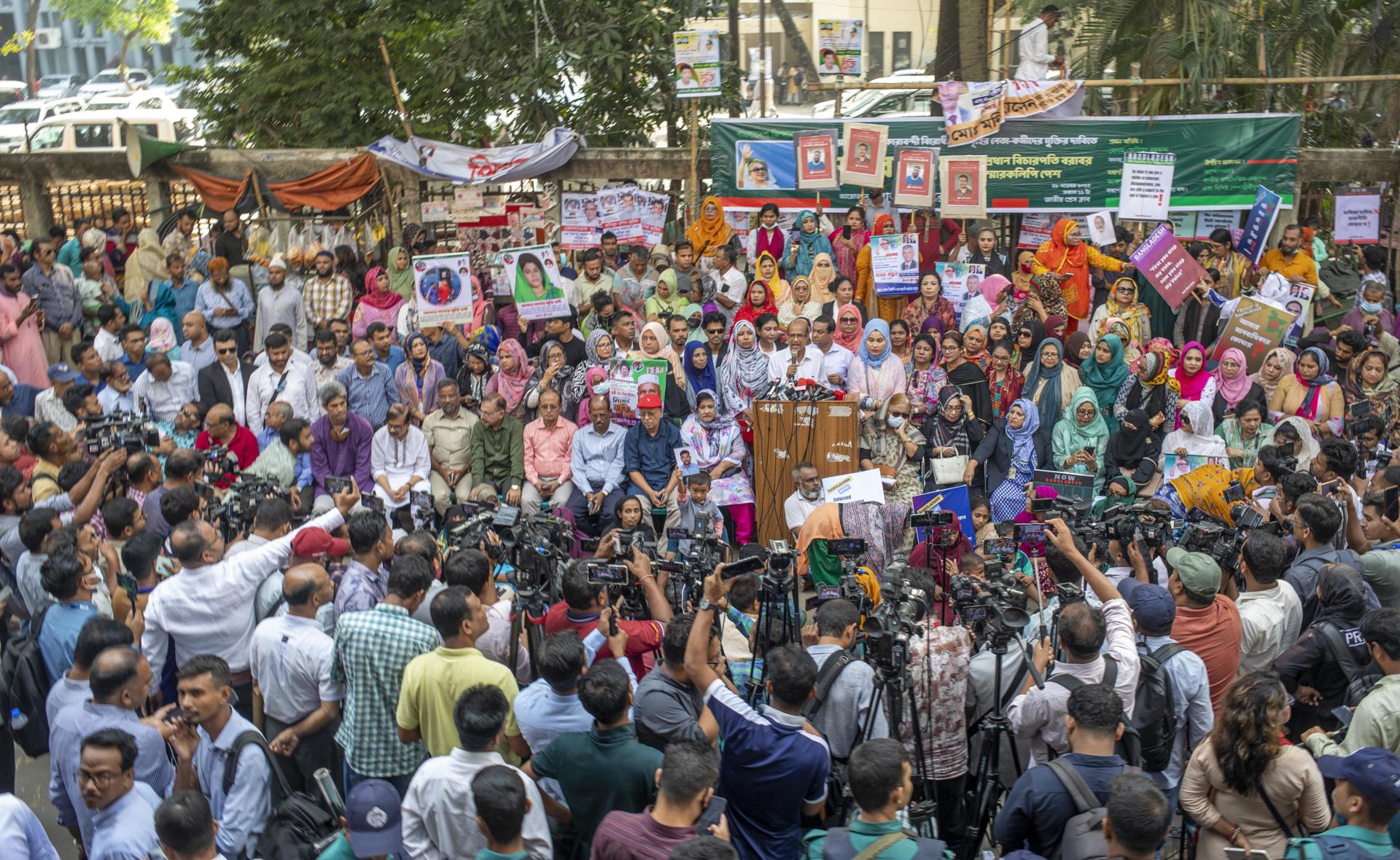Lengthening Shadow Over Democracy
January 13, 2024 | Expert Insights

The road leading to the January 7th election in Bangladesh was strewn with controversial obstacles- alleged suppression of the opposition, dummy candidates and the boycott by major political parties. The abysmally low turnout elicited this response from the Voice of America, “One-Sided Bangladesh Election Raises Fear of One-Party Rule.”
Ms Sheikh Hasina's fifth term as Bangladesh's Prime Minister may have been secured, but the allegations flying thick and fast raise disturbing questions about the state of Bangladeshi democracy. The main opposition party, the Bangladesh Nationalist Party (BNP), boycotted the election, rendering the election into a one-horse race.
Prime Minister Hasina first became the prime minister in 1996 and was re-elected in 2009, remaining in power since.
The boycott, fuelled by the unfulfilled demand for a neutral caretaker government ( a practice still followed by Pakistan but abandoned by most democracies), signalled a deep rift in the nation's political landscape. "Our peaceful movement will continue," vowed Mr Tarique Rahman, the exiled BNP leader, his words echoing across the oceans from London. He vehemently denied any involvement in pre-poll violence, denouncing accusations against him and his party as "politically motivated."
Meanwhile, Hasina's supporters painted a contrasting picture. "She has brought stability, that's undeniable," declared Law Minister Mr. Anisul Huq, his voice resonating with pride. He lauded her for boosting the nation's confidence and guiding Bangladesh towards economic prosperity.
Indeed, under Hasina's leadership, Bangladesh has transformed. Once a struggling nation, it now stands as a regional economic powerhouse, its garment industry a global giant. Millions have climbed out of poverty, their lives enriched by the fruits of this newfound success. However, the winds of change are swirling. The economic boom sputtered in mid-2022, caught in the crossfire of the pandemic and a global slowdown. The challenges ahead are formidable, demanding a united front to navigate the turbulent waters.
New Delhi has enjoyed excellent relations with the AL government, and the past decade has been perhaps the least fractious between the two neighbours.
Background
While the Awami League (AL) enjoyed a landslide victory, securing 222 of the 300 parliamentary seats, the low voter turnout and allegations of "dummy candidates" cast a long shadow over the fairness of the elections. As the curtains were rung down on the polling on election day, the Election Commission estimated a dismal turnout of just 27.15 per cent, later upgraded to 41.8 per cent. In 2018, the voter turnout had been more than 80 per cent. Independent observers and opposition voices suggest the official figures might be inflated, further questioning the legitimacy of the mandate.
The current opposition, the Jatiya Party, managed to secure just 11 of the 300 parliamentary seats. The sheer number of seats won by the AL is undeniable. Accusations of voter intimidation and manipulation, primarily directed at AL cadres, also add fuel to the fire. Images of empty polling stations and anecdotal reports of suppressed voting paint a worrying picture of an election lacking genuine participation.
Adding to the intrigue are the independent candidates who secured 63 seats, becoming the second-largest bloc. These individuals, largely rejected by the AL itself, have raised eyebrows. Analysts contend that these were "dummy candidates" strategically fielded by the AL to create an illusion of competition and mask a one-sided contest.
The BNP and human rights groups claim a brutal pre-election crackdown silenced dissent, with hundreds of opposition figures arrested. Reports also surfaced of intimidation in rural areas, with threats of violence, job loss, or even benefits denial used to coerce voters toward the AL. Further, irregularities hang heavy with claims of ballot box stuffing and manipulated voting records.
However, such accusations are not new to Bangladesh's electoral politics. The BNP's boycott echoes their actions in 2014 when the AL secured a landslide victory under a cloud of rigging allegations. Four years later, the BNP returned to the fray, hoping to challenge the AL's dominance. However, the 2018 elections were not much better. Despite their participation, the polls were again marred by accusations of rigging and voter suppression.

Analysis
Hasina's muted victory celebration paints a complex picture. Despite securing another term, the shadows of controversy and unrest linger. Her call for restraint amidst opposition allegations of a heavy-handed crackdown reveals a nation divided. On one hand, the Awami League's subdued victory celebrations hint at an awareness of the contested nature of the win. Perhaps they acknowledge the concerns about irregularities and voter intimidation raised by the BNP and human rights groups. The chilling numbers speak volumes: 10,000 arrests, 16 dead, and 5,500 injured in the aftermath of a single opposition rally. These figures alone cast a heavy shadow on the legitimacy of the outcome.
Human Rights Watch's accusation of politically motivated arrests adds fuel to the fire. Filling prisons with opponents creates a climate of fear and suppression, stifling dissent and undermining the very essence of a democracy. While the AL denies these claims, the perception of a one-sided crackdown remains.
Political analysts anticipate that repression would likely rear its ugly head, silencing critical voices and curtailing political participation. Human rights abuses could become commonplace, with dissenting groups bearing the brunt of the oppression. Beyond the erosion of fundamental rights, economic stagnation could become another grim reality. Unchecked by a vibrant opposition, the government might lose its impetus to address pressing economic challenges or implement crucial reforms. Inefficiency and complacency could take root, stifling growth and jeopardizing the gains made by Bangladesh in recent years.
Furthermore, social unrest becomes a distinct possibility in a one-party ecosystem. Without a credible opposition to articulate grievances and channel frustrations, simmering discontent among various sections of the population could boil over into social unrest and instability. The nation's social fabric, already strained by existing inequalities, could unravel further, posing a serious threat to its long-term peace and prosperity. Therefore, the chance of a one-party state is not merely a hypothetical concern; it's a chilling reality that must be averted at all costs.
Addressing the concerns surrounding the recent elections, strengthening democratic institutions, and ensuring a level playing field for all political actors are crucial steps towards safeguarding Bangladesh's fragile democracy and securing a brighter future for its citizens.
Assessment
- The global slowdown and the lingering effects of the pandemic threaten to dampen this hard-won prosperity, casting a shadow of uncertainty over Hasina's future and the fate of Bangladesh's fragile democracy. The contrast between these two narratives - one of triumph and the other of unease - captured the essence of this tense election, leaving the nation at a crossroads with a question hanging heavy in the air: which path would Bangladesh choose?
- Whether Hasina can bridge the political divide and whether the BNP finds its voice within the system remains to be seen. One thing is certain: Bangladesh's journey, like its recent elections, is far from over. The story continues, its chapters yet to be written, its ending still unknown.
- India, a close ally of the AL Government, could play a role in encouraging a healing touch by the ruling dispensation to eventually restore the confidence of the world at large on Bangladesh's democratic credentials.








Comments